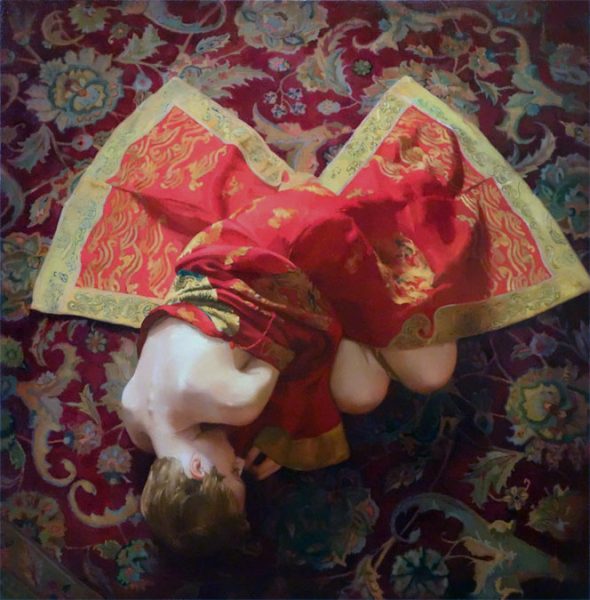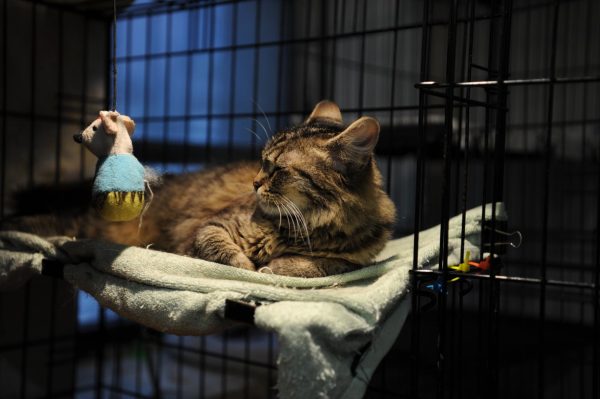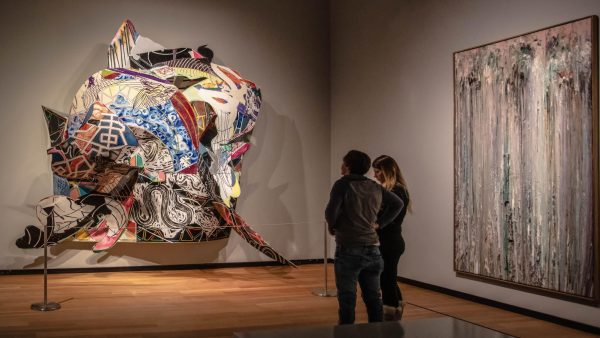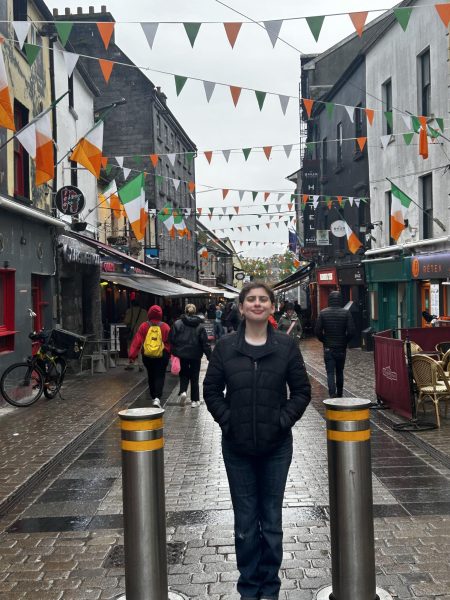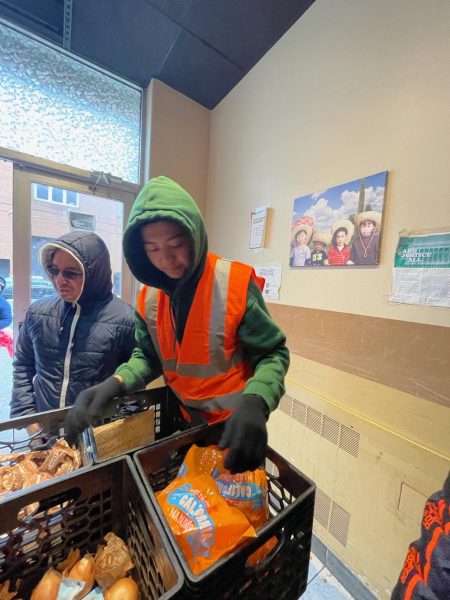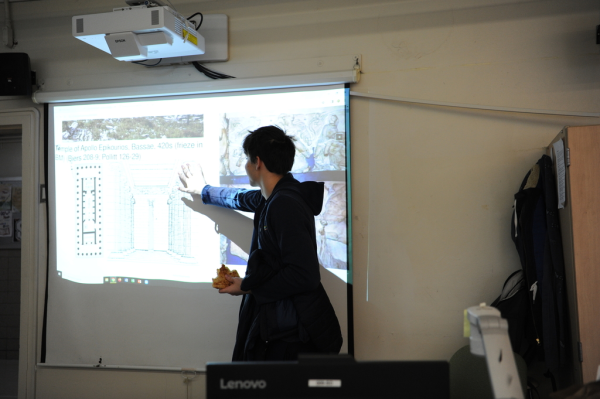Bronx Science’s Stage Manager: A Profile on Tenzin Samten ’24
After their fourth Bronx Science production, Samten shows what it means to be a Stage Manager.
Tenzin Samten ‘24 is the Stage Manager for Bronx Science’s Drama Department.
As the seniors receive their roses ranging from all the colors in the rainbow, the auditorium is filled with applause, ringing in everyone’s ears. The curtains begin to close signifying the end of the Spring Musical, but a beginning of a chant. The seniors pick up the Stage Manager and raise them high, yelling “Samten, Samten, Samten” over and over again, with tearful eyes as they realize it will be their last time picking Samten up and their last musical.
In Fall of 2022, Samten Tenzin ‘24 became the Stage Manager for Bronx Science Drama Department as a sophomore. Typically, the role of Stage Manager is given to juniors or seniors, but with the pandemic, the school’s faculty advisor never had the chance to interview students for the role. With Samten being just a sophomore and having no guide, they had to teach themselves the ropes of how to be a Stage Manager.
Recently, Samten helped make the Spring Musical, Rent, come to life, which is the most complex show they have worked on. Even with the musical’s complexities in technical theater, the results paid off and it wouldn’t have been possible without Samten’s leadership.
Before any show and auditions, Samten holds a meeting with the leadership and the current Drama Department director, Biology teacher Dr. Emily Schmidt. The leadership is composed of the directors and assistant directors for each department (squads) within Stage Crew: Props, Costumes, Lights, Sounds, and Paint. They all work together to discuss the logistics behind preparing for the performances and deadlines needed to be met. But, most importantly, they explain how the Stage Crew operates. As Stage Manager, Samten’s first and foremost role is to be a leader for Stage Crew. That means keeping the theater director updated with any changes within the departments and understanding what information Samten needs to send to crew members.
At a regular Stage Crew meeting, Samten starts by taking the attendance for the rosters. A task so simple, but necessary to ensure crew members are committed. Afterwards, Samten goes from squad to squad to give notes relayed by the theater director ranging from when to bring in tables to when props and costumes will come or when blackouts happen during the shows. This may all sound like something anyone can do, but it takes more than just checking off the box. In fact, their job gets harder with the arrival of tech rehearsals and dress rehearsals, or otherwise known as the week of Run Crew.
These specific rehearsals are only done by Run Crew, which consists of directors, assistant directors, and their most committed crew members in their respective squads. These people are chosen to help with backstage, spotlights, stagehands, or sounds on the day of the performances. They are responsible for making the production more alive through lighting, costume changes, music, sound effects, changing props, moving tables and chairs, etc. Run Crew does everything that will help cast members to stand out and act out the scenes in an appropriate setting in the plot.
But this will only be possible with practice, so during the tech rehearsals and dress rehearsals a full run-through is done meaning cast and crew members pretend they are giving an actual performance to a live audience. This in itself is a daunting task as directors, assistant directors, and stage manager are active all time throughout the show to send out cues to other people. To better understand, cues are anything ranging from moving tables, turning spotlights on, costume changes, etc. Cues need to be done quickly and this is only possible when the stage manager or directors is keeping track and ready to alert anyone in giving the cues. “A stage manager must cue the other squads to keep movement consistent throughout. A blackout on set may seem simple, but in reality, it involves set changes and having the spotlight and light board all black out at the same time, or else there is a very obvious disconnect,” Samten said. On any given performance days, Samten is seen working in the back of the auditorium with the sound and light boards, as out of all cues done, cues from departments Lights and Sounds, are most difficult as everything needs to be done perfectly and quickly.
Even if they are not backstage with Props, Costumes, and Stagehands, their presence is still known to everyone with the help of walkie-talkies. Walkie-talkies are given to set individuals such as Lara Adamjee ’25 and Cindy Piao ’26. who are in the lights room on the 2nd floor to control the spotlights. With this technology, Samten also alerts Run Crew members of their cues such as blackout, costume changes, and tables. This communication can only be done by learning how each squad works.“Being stage manager means having to know about the intricacies of each squad, so that all of their work can be combined into one production. It means keeping track of lights cues, spot(light) notes, how to configure the walkie-talkies, notes on the arrival of costumes, set designs, and relaying prop information from theater director to squad,” said Samten.
After a practice run-through, Samten, leadership, and Dr. Schmidt come together to discuss any missed cues, or if something should be done faster or slower. These new notes are then used to edit their cue sheets. Cue sheets are Google Sheets or Excel Sheets made by each director that contains all the necessary cues that need to be done in each scene. Some scenes just have one cue while others can have 10 cues. But the directors and Stage Manager don’t edit anything till they arrive home as late as 10 p.m. because some days Stage Crew ends at 7:30 p.m. or 9 p.m. During those editing days, Samten and countless other members of Stage Crew join a discord call to assist. These typically last until 4 p.m. the next day, because of how complex the cue sheets are, especially Lights and Sounds cue sheets.
With the amount of time needed to bring a production alive, it will inevitably cause some stress for the individuals involved. Joining Stage Crew means the students need to manage school work, while simultaneously spending 6 hours to 10 hours to work on the production. Samten faces these daunting tasks every day as the workload for Stage Crew never ends, along with piles of clips they need to edit for Wolverine TV late at night. But even with how many hours of work they spend each week, they still find a way to support crew members. For Samten to alleviate these issues, their most important job as Stage Manager is, arguably, to be a leader that shows empathy and kindness.
As Samten said, “The most important part is being a leader. It means reaching out to people who are struggling under pressure and trying to alleviate some stress […] All of this responsibility and empathy comes with being a stage manager. Without this, despite all the technical knowledge in the world, you cannot help build a safe community.”
Samten does just that. They constantly join in the fun and make sure everyone has a good time. During late-night and weekend rehearsals, Samten holds Rent Karaoke with Mia Jannson ’25 and performs for the entirety of Run Crew and Cast members. With both their scripts out to read the lyrics to singing into one microphone, everyone enjoys the marvelous performance of Samten acting as Roger (Mark’s best friend) and Jannson acting as Mark (main character of Rent). The most beautiful part of Rent Karaoke is the actual reactions of the actors who played as Mark and Roger for Rent, Noah Horn ’23 and Matthew Ferencz ’23, respectively. This experience is truly unforgettable and acts as a symbol of friendship within the community. With memories such as these, it is no wonder why students in Stage Crew have a difficult time saying goodbye when the time comes to see their friends leave for college or just not be with them after working together for many hours a week.
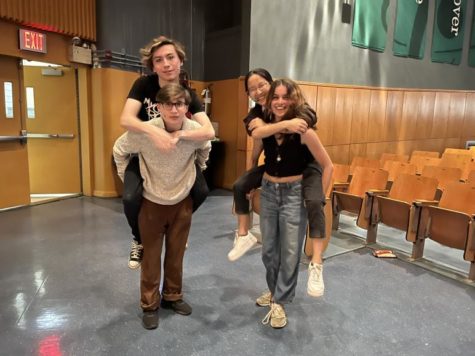
But regardless, all the work done by both Stage Crew and Cast pays off as they bow with the biggest smile on their face and the audience is excited to see them all one last time. Oftentimes, audiences overlook the crew member’s work, not realizing that there would never have been a production without them. This is especially true for our Stage Manager, Samten, who has done so much to make this year’s musical a complete success. They deserve much applause for what they have accomplished, but most importantly gratitude — gratitude from not only the audiences and Cast, but also the Stage Crew community. Samten was the glue that helped form such a close bond, leading for friendships to be made and will never be forgotten, even if the friendships fall apart over time. They showed everyone, including me, what it meant to be a leader and a friend.
All of this responsibility and empathy comes with being a stage manager. Without this, despite all the technical knowledge in the world, you cannot help build a safe community.
Benzir Raida is a Chief Graphic Designer and Groups Section Editor for ‘The Observatory' yearbook and a Staff Reporter for 'The Science Survey.' She...


